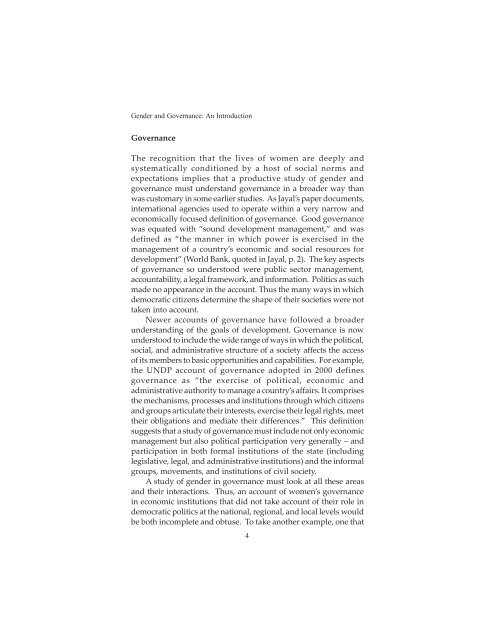Essays On Gender And Governance - United Nations Development ...
Essays On Gender And Governance - United Nations Development ...
Essays On Gender And Governance - United Nations Development ...
Create successful ePaper yourself
Turn your PDF publications into a flip-book with our unique Google optimized e-Paper software.
<strong>Gender</strong> and <strong>Governance</strong>: An Introduction<br />
<strong>Governance</strong><br />
The recognition that the lives of women are deeply and<br />
systematically conditioned by a host of social norms and<br />
expectations implies that a productive study of gender and<br />
governance must understand governance in a broader way than<br />
was customary in some earlier studies. As Jayal’s paper documents,<br />
international agencies used to operate within a very narrow and<br />
economically focused definition of governance. Good governance<br />
was equated with “sound development management,” and was<br />
defined as “the manner in which power is exercised in the<br />
management of a country’s economic and social resources for<br />
development” (World Bank, quoted in Jayal, p. 2). The key aspects<br />
of governance so understood were public sector management,<br />
accountability, a legal framework, and information. Politics as such<br />
made no appearance in the account. Thus the many ways in which<br />
democratic citizens determine the shape of their societies were not<br />
taken into account.<br />
Newer accounts of governance have followed a broader<br />
understanding of the goals of development. <strong>Governance</strong> is now<br />
understood to include the wide range of ways in which the political,<br />
social, and administrative structure of a society affects the access<br />
of its members to basic opportunities and capabilities. For example,<br />
the UNDP account of governance adopted in 2000 defines<br />
governance as “the exercise of political, economic and<br />
administrative authority to manage a country’s affairs. It comprises<br />
the mechanisms, processes and institutions through which citizens<br />
and groups articulate their interests, exercise their legal rights, meet<br />
their obligations and mediate their differences.” This definition<br />
suggests that a study of governance must include not only economic<br />
management but also political participation very generally – and<br />
participation in both formal institutions of the state (including<br />
legislative, legal, and administrative institutions) and the informal<br />
groups, movements, and institutions of civil society.<br />
A study of gender in governance must look at all these areas<br />
and their interactions. Thus, an account of women’s governance<br />
in economic institutions that did not take account of their role in<br />
democratic politics at the national, regional, and local levels would<br />
be both incomplete and obtuse. To take another example, one that<br />
4

















